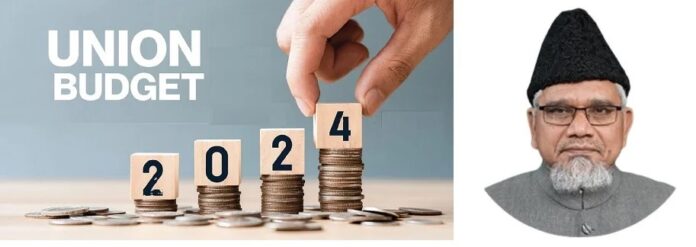India Tomorrow
NEW DELHI: Jamaat-e-Islami Hind (JIH) vice-president Prof. Salim Engineer has expressed disappointment with the Union Budget, claiming it fails to address the needs of the poor, marginalized communities, Scheduled Castes (SC), Scheduled Tribes (ST), and religious minorities in India.
In a statement to the media, Prof. Salim acknowledged some positive aspects of the budget, such as adherence to fiscal prudence, assumed tax buoyancy, increased capital gains, and securities transaction taxes. These measures, he noted, aim to stabilize asset prices and make Indian exports more competitive by reducing or eliminating customs duties across several sectors.
However, Prof. Salim emphasized that despite these positives, the 2024-25 budget does not provide sufficient relief for the underprivileged. “The budget seems to benefit only one class of society,” he stated. He highlighted that while there is an increase in health allocation, it remains at just 1.88% of GDP, and the education allocation, though increased, is only 3.07% of GDP. He demanded that health and education allocations should be at least 4% and 6% of GDP, respectively.
Criticizing the budget for being insensitive to the government’s slogan of “Sab ka Vikas,” Prof. Salim pointed out the drastic reduction in budgetary allocation for many schemes aimed at minorities. He noted that the Ministry of Minority Affairs (MoMA) received just 0.06% of the total budget, and called for at least 1% to be allocated for minority welfare.
“The budget is contractionary in nature,” Prof. Salim stated, arguing for an expansionist approach to address issues of unemployment, inflation, and inequality. He criticized the negligible increase in expenditure despite substantial revenue growth, highlighting the government’s slashing of social sector allocations, including the Mahatma Gandhi National Rural Employment Guarantee Act (MGNREGA) scheme, which has not seen an increase despite high unemployment rates. He also condemned cuts to food, fertilizer, and petroleum subsidies, calling them “highly irrational and condemnable.”
The JIH leader expressed concern over the budget’s favouritism towards the wealthy and big corporations, noting that corporate tax revenue (17%) is less than income tax revenue (19%), while indirect taxes continue to burden the poor and middle class. He criticized the heavy subsidization of corporations under the new employment incentive scheme.
To fund welfare measures, Prof. Salim urged the government to curb corruption, impose higher direct taxes on the wealthy, and reduce indirect taxes to alleviate inflation’s impact on the poor. He called for special measures and policies for the welfare of Dalits, backward classes, SCs, STs, and minorities, particularly Muslims, with concrete plans and adequate budgets rather than symbolic gestures.
He also highlighted that 19% of the budget is allocated to interest payments, with borrowing and other liabilities making up 27% of the budget. Prof. Salim advocated for reducing dependence on debt and moving towards an interest-free economy. He urged the government to promote interest-free microfinance and banking on a large scale to boost the economy, generate employment, and reduce social unrest.
Prof. Engineer reiterated JIH’s commitment to advocating for a budget that addresses the needs of all sections of society, especially the marginalized and underprivileged.





